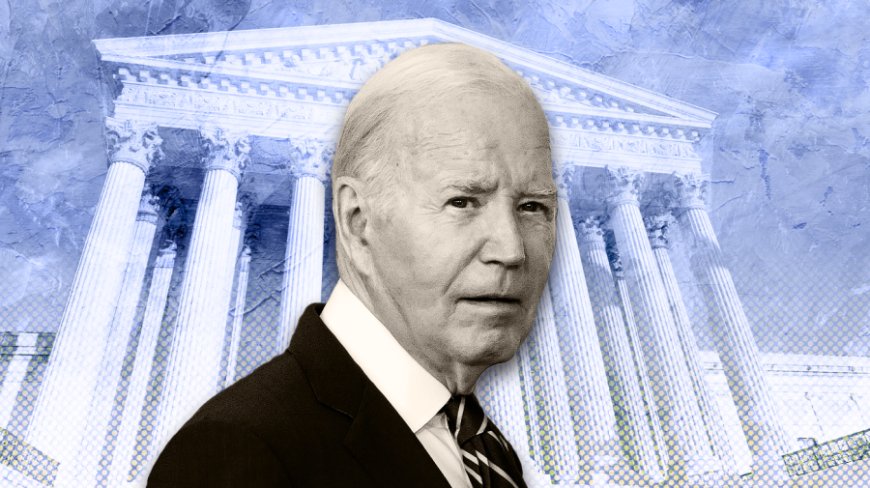Biden’s Supreme Court reforms will never happen, but they’re still important.
Having a functional Supreme Court is not a political issue any more than having a functioning heart is a lifestyle choice. And while Biden’s current initiative is doomed to fail, it’s the beginning of a life-or-death discussion about the future of the court.

President Biden has traditionally been wary of reforming the Supreme Court. He even ignored his own presidential commission’s modest proposals for improving the court’s transparency and ethics. Nonetheless, on Monday, Biden proposed imposing 18-year term limits for justices and a binding ethics code.
Sadly, this new initiative is not going to be one of the great successes of Biden’s presidency. Supreme Court reform is a contentious issue. Having spent years and enormous political capital working the court into its current shape, Republicans have little interest in reform and have already tagged his proposal as “dead on arrival.” And institutionalists of all political persuasions — including myself — are cautious about engaging in what may be populist tampering with what has been a cornerstone of American democracy.
But all that is going to change.
Few people realize it yet, but the Supreme Court is now one of the walking dead, a zombie institution, shuffling along until so many bits fall off that it becomes incapacitated. It may seem healthy enough now, but the rot has already set in.
The court faces multiple, interlocking problems. For one, justices can only be confirmed when the same party controls both the presidency and the Senate. Though there is no formal rule in the Constitution stating this, there might as well be. What Democrats view as bad-faith shenanigans over the Merrick Garland, Neil Gorsuch and Amy Coney Barrett nominations have now made it nigh impossible for a Democratic Senate to confirm another Republican Supreme Court appointment, ever. Republicans will no doubt, return the favor. Justice Samuel Alito will never be replaced by an Elizabeth Warren, no matter how long the seat has to sit empty, if Republicans have anything to say about it.
The result will be instability and ideological court-packing. As justices retire or expire, they cannot be replaced. That means a court with fewer than nine justices for possibly years at a time, followed by a single president appointing multiple justices simultaneously when the political stars align. These wild swings in the makeup of the court will see politically unpopular precedents rapidly overturned, only to be reinstated when the wheel turns once again. This is the antithesis of what the Supreme Court is supposed to be.
Additionally, the Supreme Court’s refusal to abide by the ethics rules and procedures that govern all other federal courts is already eroding its legitimacy. No longer viewed as an honest broker, the instability caused by the court’s final capture by partisan politics will complete the process.
So while Republicans and Democrats argue back and forth about whether and how to fix the court, it’s just a matter of time until the dysfunction becomes so obvious that something is actually done about it.
Still, Biden’s proposals aren’t going to be effective. And while his op-ed doesn’t explicitly say so, the president apparently wants to impose these reforms via legislation — a move almost certain to fail in today’s partisan Capitol.
There are a couple of problems here. Imposing term limits is tricky, as the Constitution specifies lifetime appointments for federal judges. There are clever proposed workarounds that would have the practical effect of creating term limits via legislation, even though actual term limits would require a constitutional amendment.
But term limits alone won’t really fix the problems facing the court. While fixed terms for Supreme Court justices would have some advantages, the real problem isn’t getting people off the court — it's getting them on. The average “term” for Supreme Court justices is currently 16 years. So while it might reverse the current trend of appointing younger and younger justices who can serve for longer and longer, 18-year fixed terms won’t improve turnover on the court or make replacing justices less political or more predictable.
There’s also a profound philosophical problem with reforming the Supreme Court through legislation. It’s just not the sort of thing that one party should be doing because it happens to have the temporary power to do so. Fundamentally reform of one of the three branches of American government has to be done with the broad agreement that comes only with a constitutional amendment. Anything else is dirty pool.
Finally, Biden’s plan for a binding code of ethics cannot be accomplished by legislation. There is already legislation imposing a binding code of conduct on Supreme Court justices; the court claims it is unconstitutional and ignores it.
Supreme Court reform is inevitable. But it cannot be done by half-measures or imposed by a temporary majority. When it comes, it will be as consequential as the 17th Amendment, which made senators directly elected by voters instead of appointed by state legislatures. That wasn’t what the founders had in mind, but neither was the increasing dysfunction that sometimes left Senate seats vacant for years at a time.
Having a functional Supreme Court is not a political issue any more than having a functioning heart is a lifestyle choice. And while Biden’s current initiative is doomed to fail, it’s the beginning of a life-or-death discussion about the future of the court. Those conversations are never comfortable, but that doesn’t mean you can avoid them.
Chris Truax is a charter member of the Society for the Rule of Law and an appellate attorney.
What's Your Reaction?





















































